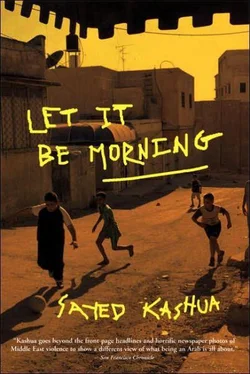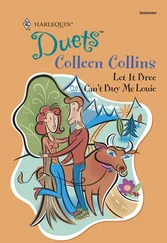I stay sitting there on the steps. In our house we know we won. My brothers and father go to check out the new houses. I go inside and wipe off the blood with a dry piece of paper. My wife brings me a glass of water. I drink half of it and hand it back to her. I go into my boyhood room and lie down, my face in the pillow. My body is trembling and my face is on fire. I shut my eyes and cry in silence.
My mother comes in. I manage to open my eyes just slightly and see her through my wet eyelashes. She leaves the room and whispers, “He’s asleep,” then shuts the door behind her.
I lie on my bed and think of my mother, picture her as if she were a little girl before a class trip. Then I think of her rushing about in the kitchen, preparing sandwiches, wrapping them in silver foil. The sandwiches are my father’s favorite, with fried ground meat and pickles, sliced lengthwise. He won’t touch them if she slices them the usual way, four such sandwiches for him and two for her, with cheese. She’ll eat whatever there is. It’s food for the trip. She rushes about, wearing a colored scarf on her head, sweating, short and fat. When I was a child, I hated how my mother looked. It took me a long time to realize she was considered a pretty woman. She still is, for her age.
In my daydream my brothers are asleep by now, but I can’t doze off. I could never fall asleep on days when my parents went away for their regular ten-day vacation. Always ten days, always in July, sometimes to Turkey, sometimes to Eilat, or Sinai or Egypt, and lately to Jordan too. It happens every year, and I just can’t get used to it. In fact, it gets worse as the years go by. I stand there in silence, leaning against one of the kitchen walls, and watch her. She’s preparing coffee. In a moment, she’ll be pouring it into a thermos bottle, because my father can’t last half an hour without his extra bitter coffee, with no sugar.
It’s late, and my father went to bed long ago. Their suitcase is packed and soon their food will be packed too. All my mother has left to do is to fill a few bottles with water and put them in the freezer. They’ll be frozen by the time she and my father leave, and the cold water will last all the way to Cairo. She finishes, takes another look in the fridge, counts the sandwiches and mutters to herself as she tries to make sure she hasn’t forgotten anything. The bus will be arriving soon, and they’ll be leaving at five A.M. She has just two hours left. Everything’s ready.
“Come on, get into bed,” she tells me, taking off her scarf and using it to wipe the perspiration from her face and forehead. How I hate that gesture of hers. My mother doesn’t care about me. I’m convinced of it. Mother never understands what I am going through. If she did, she’d never have go and leave me home alone. When I told her earlier in the evening that I didn’t feel sleepy, because I’d slept a lot in the afternoon, she believed me, and when I say good night to her now and head for the children’s room, she’s sure I’m going to sleep. My mother isn’t the kind of mother who tucks her children into bed at night. She keeps saying she can’t understand women who are sad that they’re childless, and that only crazy women have children. My mother brought three children into the world and she keeps telling her girlfriends and us that it’s too many. My mother doesn’t love us. At least she has never told any of us that she loves us. Sometimes I think my brothers have no problem with it, because they seem pretty happy. For me, having a mother who hates us is tough, but I never mention it to anybody.
I stay awake. I know Mother is still awake too. How she loves these trips. She keeps telling people that without these annual trips she’d collapse. She works like a dog all year and then come the ten days without dishes, without cooking and especially without children. I hear her get into the bathtub to bathe and I picture her fat body with all the soap and water. My father wakes up half an hour later and he too begins to get dressed. They talk quietly, in order not to wake anyone. I can’t hear what they’re saying. I wait another few minutes, wipe away my tears and get up to go to the kitchen. Soon they’ll be leaving. I say good morning and they don’t reply. They’re checking their papers and their passports. “Go wait outside,” Father says. “Watch the bags, and call us when the bus gets here.”
I sit on the steps next to their bags. Dawn is breaking, and it’s a little chilly even though it’s summertime. The hair on the back of my hand bristles and I enjoy the feel of the goose bumps on my skin.
What could possibly happen? I ask myself, and try not to answer the question. They go away every year and in the end they come back. I struggle not to think all the bad thoughts that race through my mind, because I know that if I do, they’ll probably come true. I know for sure that if anything bad happens to my parents, it will always be because of me. I have to think positive. I’ll try to concentrate on the presents they’ll bring me. I bet they’ll bring me sneakers and maybe this time they’ll get the right size.
I see the bus coming up the road and I call out like the happiest kid in the world, “The bus is here.” My parents, who are all ready, rush outside, as though if they’re a second late, the bus will leave without them. My father carries the large suitcase, my mother takes the lunch bag and I follow with a container of water covered in Styrofoam, which I carry with both hands. They put everything into the luggage compartment of the bus, except for the water, the coffee and the little bag that Mother carries on her shoulder. Most of the passengers are adults but a few have brought along a child or two. My parents get into the bus, sit by the window nearest me, look at me and don’t say a word. They don’t even wave good-bye and I don’t wave to them either. The bus begins to pull out. I wait for it to disappear in the direction it came from and only then can I relax my muscles and let my body tremble.
I have ten days of waiting ahead of me now. I always remind myself that it’s only nine nights. The nights are the main problem. I pull out the chart I’ve prepared, of the days and the nights, and allow myself to tick off the first day even though it hasn’t begun yet. Grandmother will be arriving soon, as she does every year, bringing Grandfather with her. They’ll stay for ten days and nine nights.
She arrives before my brothers wake up, just as she does every year. They live not far from us, a five-minute walk away. If their house were larger, my mother would send us to stay with them, but they live in a single room. The rest of the house is used by my only uncle, my mother’s brother. My grandmother arrives early because she doesn’t want people to see her carrying Grandfather on her shoulder. She is old, she looks about a hundred years old, but she’s still strong and my grandfather is light as a small child. My grandmother is perspiring. She puts Grandfather down on the bed in my parents’ bedroom in his regular position, lying on his back, staring at the ceiling. My grandfather never gets out of bed by himself. He doesn’t move at all. For as long as I’ve known him, he’s been in this position, just lying on his back. My parents keep saying what a strong man he was before his illness. They say he was the richest man in the village, the best salesman, the first man to buy a car and to build a fancy stone house. But we never knew him like that. Sometimes my parents tell us how he lay in bed after he returned from the pilgrimage to Mecca. They say that right there, in the middle of town, in front of everyone, a thief was beheaded, because that’s how it is in Islam and it scared us out of our wits and we never stole anything ever. They say the sight of it destroyed him completely, and that he was a different person after that.
Читать дальше












